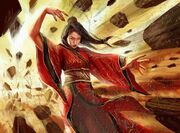The continent of Aisho is itself too large to be an island and too small to be a continent, thus making the two definitions both correct and incorrect at the same time... So it's often called either. The island itself has varying geographical regions, which themselves have varying climates. To the west... The land is very flat, some areas being well below sea level. The western lands also have a warm tropical climate, and are mostly marshlands, it is because of this that the area receives massive amounts of rain flow from the mountains in the continent's center, making it a prime location for growing rice and other crops (no, just rice).
South of the central mountains... The land consists of alternating planes and forests, leading up to forests that creep up onto the mountain side. The mountain range itself i

s highest in the center of the enormous island, but ranges slightly west and all the way over the northern coast of the eastern portion of the continent.
To the east... The lands south of the lower mountains are predominately plains. Horses roam freely, inhabiting most of the eastern land. During the winter, the eastern part of the island receives tremendous amounts of snowfall, often making travel for large groups impossible.
Social[]
Feifs and the People[]
The entire country is divided in rule and is composed of well over 50 fiefs. People from the west are predominantly rice farmers. Additionally, there are fewer fiefs in the west than the other areas of the continent. The center holds the most fiefs, possibly due to the natural water flow that they receive from the mountain. The people in the center of Aisho tend to make their cities and villages at ground level around the mountain. The mountain itself is filled with various dangers: mountainous creatures, monk temples, defiant mountain villages and other unknown sociocultural outcast establishments. The center of Aisho is where a large portion of strife takes place.
The central government, located south of the mountain is in constant strife amongst itself with local daimyos (lords) fighting for power of the government itself. This unstable mass of rule also wars against the people living in the mountains, attempting to both establish control over them, and disallow various mysterious blockages of river flow caused by unknown forces.
The people of the east are not far off from their relatives in the center, fighting for power and attempting to establish a large government to topple the central one and reign over the mountain and its resources.
The Celestial Order (Caste System)[]
At the top is the Emperor, below the emperor are the lords of the clans, the lord of the families and the lords of the minor clans.
Below the daimyos is the samurai caste (Bushi, and shugenja) those who live and die to serve the lords of Aisho.
Then are the "half-people" the Heimin, including the farmers, craftsmen, artisans and merchants.
Lastly are the "non-people" The hinin or eta, including geisha, morticians, tanners and torturers.
Magic[]
The use of magic is an extreme rarity in the lands of Aisho seen only used by creatures and a special few humans known as the Shugenja. Shugenja are spell casters who gain and learn their abilities from the Kami or "gods" but the word Kami is more of a translation into the word "spirit", These spell casters like wizards are forced into keeping a kind of "spell book

" With the use of Ofuda "Scrolls" in order to cast their magics. Shugenja tend to have one element they are most proficient with, and are barred from the opposite elemental force. A Shugenja with the element of fire on their side cannot use the spells of water. There are other types of spells casters as well, but these are seen more as witches and demon worshippers, specifically those that are called the Maho Tsukai, or blood sorcerer. Necromancers and users of the darkarts.
The Emperor[]
Since the time of the first, the Emperor has been known as the Son of Heaven. This is not an euphemism, but rather an indication that the Emperor has indeed been directly blessed by the heavens, which endorse his rule over all of Aisho. This was true of the Satou dynasty, founded by Satou son of the Sun and Moon, and blessed by his mother (Lady Sun) upon his ascension to the throne. Because of the position's endorsement by the heavens, the Emperor holds dominion over all land and all men that dwell within the realm of mortals. The Emperor grants portions of the land he owns to those who have sworn fealty to him, most notably the Clan Champions, who in turn divide it among their family and followers. In exchange for his allowing to dwell upon and live off his land, the Emperor expects a certain amount of taxes in return, and it falls to his followers to oversee, harvest, collect and return those taxes to the imperial city.
(more to be added soon)
(to be added)
